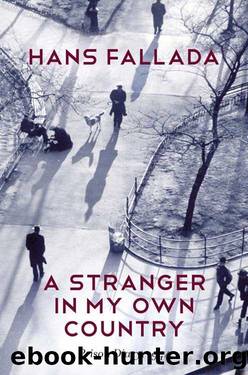A Stranger in My Own Country: The 1944 Prison Diary by Hans Fallada

Author:Hans Fallada [Fallada, Hans]
Language: eng
Format: epub
ISBN: 9780745681559
Publisher: Wiley
Published: 2015-07-24T16:00:00+00:00
Notes
1. Incorrectly dated: the Reichstag burned down on 27 February 1933. Fallada had to rely entirely on memory when writing these reminiscences, so there are occasional errors and misdatings.
2. The publisher Ernst Rowohlt (1887–1960). Fallada met him through Egmont Seyerlen (1889–1972). Seyerlen’s wife, Anne Marie (Annia) Seyerlen (1885–1971), had encouraged Fallada to write. His first novel The Young Goedeschal was published by Rowohlt Verlag in 1920, and all Fallada’s subsequent works up until 1943 appeared under this imprint. Over the years Fallada and Rowohlt, who always addressed each other with the more formal second person form ‘Sie’, became not just business associates but close friends. The scene in ‘Schlichters Wine Bar’ described here paints a fairly accurate picture of their relationship in February 1933. In November 1944, when Rowohlt was making plans to set up a new publishing house after the war, he went to see Fallada in the Neustrelitz-Strelitz facility with a view to securing his collaboration and support. On the relationship between Fallada and Rowohlt, see Hans Fallada, Ewig auf der Rutschbahn. Briefwechsel mit dem Rowohlt Verlag, edited by Michael Töteberg and Sabine Buck, Reinbek bei Hamburg 2008.
3. ‘Schlichters Wine Bar’ in Lutherstrasse, which had been established in the 1920s by Max Schlichter, a brother of the painter and printmaker Rudolf Schlichter; popular with Berlin’s bohemian set and a regular haunt of Bertolt Brecht, Theo Lingen, Heinrich George and others.
4. Anna Ditzen (1901–1990), Fallada’s wife since 1929, and Elli Engelhardt (no biographical data available), Ernst Rowohlt’s third wife, to whom he was married from 1933 to 1941.
5.The novel Little Man – What Now? (1932) marked Fallada’s national and international breakthrough. By the end of June 1932 more than 2,000 copies had been sold; four months later sales had reached 21,000. A film contract was soon signed; translation and reproduction rights were sold. Fallada was bombarded with inquiries from newspapers and devoted readers. He wrote to his parents on 16 July 1932: ‘We are really happy, now we can easily move to a larger apartment, furnish it nicely, pay off our debts, and above all have a longer summer holiday.’ (Letter to Wilhelm and Elisabeth Ditzen, Hans Fallada Archive, Neubrandenburg)
6. The novel The Good Earth by the American writer Pearl S. Buck (1892– 1973) was published in German for the first time in 1933.
7. The famous epic of the deep South by the American writer Margaret Mitchell (1900–1949) appeared in June 1936, and immediately became one of the biggest best-sellers in the history of American literature. The film of the same name had its US cinema release in 1939, and became one of the most successful films of all time.
8. A chronological slip. Fallada was working on the novel Once a Jailbird in January 1933, but did not begin writing Once We Had a Child until November of that year.
9. Hermann Göring (1893–1946) was the Prussian Minister of the Interior at the time of the Reichstag fire (and as such in charge of the entire Prussian police force); in April 1933 he became Prime Minister of Prussia and Commander-in-Chief of the Luftwaffe.
Download
This site does not store any files on its server. We only index and link to content provided by other sites. Please contact the content providers to delete copyright contents if any and email us, we'll remove relevant links or contents immediately.
| Afghan & Iraq Wars | American Civil War |
| American Revolution | Vietnam War |
| World War I | World War II |
Waking Up in Heaven: A True Story of Brokenness, Heaven, and Life Again by McVea Crystal & Tresniowski Alex(37003)
Empire of the Sikhs by Patwant Singh(22172)
We're Going to Need More Wine by Gabrielle Union(18072)
Hans Sturm: A Soldier's Odyssey on the Eastern Front by Gordon Williamson(16620)
Leonardo da Vinci by Walter Isaacson(11901)
The Radium Girls by Kate Moore(10907)
Educated by Tara Westover(7061)
Tools of Titans by Timothy Ferriss(6945)
How to Be a Bawse: A Guide to Conquering Life by Lilly Singh(6693)
The Last Black Unicorn by Tiffany Haddish(5075)
Permanent Record by Edward Snowden(4996)
The Rise and Fall of Senator Joe McCarthy by James Cross Giblin(4843)
Promise Me, Dad by Joe Biden(4447)
The Wind in My Hair by Masih Alinejad(4424)
The Crown by Robert Lacey(4105)
A Higher Loyalty: Truth, Lies, and Leadership by James Comey(4032)
The Iron Duke by The Iron Duke(3639)
Joan of Arc by Mary Gordon(3257)
How to be Champion: My Autobiography by Sarah Millican(3185)
